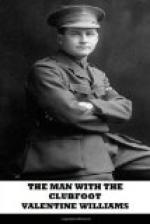It was about nine o’clock in the morning and at that early hour I had the place to myself. I felt very small, sitting at a tiny table, with tables on every side of me, stretching away as it were into the Ewigkeit, in a vast white room with mural paintings of the crassest school of impressionism.
I ordered a good, substantial breakfast and whiled away the time while it was coming by glancing at the morning paper which the waiter brought me.
My eyes ran down the columns without my heeding what I read, for my thoughts were busy with Francis. When did he come to the cafe? How was he living at Duesseldorf?
Suddenly, I found myself looking at a name I knew ... it was in the personal paragraphs.
“Lieut.-General Count von Boden,” the paragraph ran, “Aide-de-Camp to H.M. the Emperor, has been placed on the retired list owing to ill-health. General von Boden has left for Abbazia, where he will take up his permanent residence.” There followed the usual biographical notes.
Of a truth, Clubfoot was a power in the land.
I ate my breakfast at a table by the open door, and surveyed the busy life of the square where the pigeons circled in the sunshine. A waiter stood on the verandah idly watching the birds as they pecked at the stones. I was struck with the profound melancholy depicted in his face. His cheeks were sunken and he had a pinched look which I had observed in the features of most of the customers at Haase’s. I set it down to the insufficient feeding which is general among the lower classes in Germany to-day.
But in addition to this man’s wasted appearance, his eyes were hollow, there were deep lines about his mouth and he wore a haggard look that had something strangely pathetic about it. His air of brooding sadness seemed to attract me, and I found my eyes continually wandering back to his face.
And then, without warning, through some mysterious whispering of the blood, the truth came to me that this was my brother. I don’t know whether it was a passing mood reflected in his face or the shifting lights and shadows in his eyes that lifted the veil. I only know that through those features ravaged by care and suffering and in spite of them I caught a glimpse of the brother I had come to seek.
I rattled a spoon on the table and called softly out to the verandah.
“Kellner!”
The man turned.
I beckoned to him. He came over to my table. He never recognized me, so dull was he with disappointment ... me with my unshaven, unkempt appearance and in my mean German shoddy ... but stood silently, awaiting my bidding.
“Francis,” I said softly ... and I spoke in German ... “Francis, don’t you know me?”
He was magnificent, strong and resourceful in his joy at our meeting as he had been in his months of weary waiting.
Only his mouth quivered a little as instantly his hands busied themselves with clearing away my breakfast.




